Greer Gilman's Blog, page 95
December 27, 2010
"...like to the swift flight of a sparrow..."
I think she would have liked the stillness at the heart of blizzard. Though she would have worried for the mourners, snow-blind, slewing madly on the Lyke Road. It was like a Russian novel at the graveside, or the film Orlando: she was graved in snow and earth.
A few brave loving mourners came: her children, valiant friends and cousins. What touched me most was the presence of her workers, people who have stitched or printed for her twenty, thirty years. In the best mediaeval tradition, they were truly her family. We were short a pall bearer, so Tom the welder leapt to carry her, without a topcoat, through the storm.
(And he drove two of us home afterward, with one arm out the window, flicking snow from the clagged wipers. My dear friend B. is another such cheerful pragmatist: she came all the way from Boston and got safely back. No trouble, she said: she just went along hugging a snow plow and listening to requiems.)
My mother loved pretty things and always wanted me to Dress. So I wore her lovely old cameo, and the little amethyst from Venice, and the ring with nine garnets (my talisman). I wore the exquisite shawl that![[info]](https://i.gr-assets.com/images/S/compressed.photo.goodreads.com/hostedimages/1380442897i/1319734.gif) rushthatspeaks
knitted for me: cobweb-fine, greenblue, and silver-spangled: it's the heavens that I hope she's in.
rushthatspeaks
knitted for me: cobweb-fine, greenblue, and silver-spangled: it's the heavens that I hope she's in.
The understudy rabbi was inspired to tell Bede's parable of the sparrow passing through the firelight, between the darks. That was heartstoppingly beautiful. My dear![[info]](https://i.gr-assets.com/images/S/compressed.photo.goodreads.com/hostedimages/1380442897i/1319734.gif) negothick
read the 121st Psalm. My brothers spoke earnestly and well. And I said roughly this:
negothick
read the 121st Psalm. My brothers spoke earnestly and well. And I said roughly this:
She was always the mother, like the Mikado, like the Queen. The lawgiver, the last word. "Have you asked the mother?"
She was the mother, like the north star: our direction and our hope, the light we travelled by. Who ever thought that star would set?
That star, I say; but SJ was many stars, a constellation of lives: daughter; loving sister; wife; mother; mentor; working woman; friend.
And from the first, a teller of stories.
Every Saturday as a child in Mount Vernon, she'd go with her twin brother to the Embassy Theater; and afterward, she'd tell the movies to a breathless circle of her friends. And do you know what happened then?
All her life, it was narrative she loved: not the silver screen, the glamour, but the interplay of lives enacted, how it all came out. She always watched her Netflixes twice over, with an eye to craft.
As a young woman, she wrote stories; had screenplays produced on television. She had a nibble from Hollywood and was deep in talks; then one Fourth of July, she met my father, Marty Gilman, and her story changed. The romance was handled beautifully.
He had the bluest eyes, forget-me-not.
For thirty years—too brief—they worked together, bringing up a family and bringing forth his work and hers, his inventions: the children of his brilliant mind.
After his too-early death, and all her life, she went on tending to the company: the plant, they called it, as if it were the garden he had made. The people she worked with there were always like a wider family to her. They were truly her company.
And later she found a new companion in an old friend, Marty Sheridan, a writer and photojournalist, who'd been an imbedded correspondent in the Pacific Theater of War.
She loved her two Martys and they dearly loved her.
How unlike they were! the elements of fire and water; the creator, the observer; the stay-at-home, the traveller. Marty Gilman, my father, was a man like a golden peach, exuberant, bursting with life; and Marty Sheridan, cool as a martini, understated: the international man of mystery.
With him, she travelled six continents, from Venice to Beijing, the South Pacific and the south of France, the Valley of the Kings, Jerusalem, and all the peopled earth. Her passion was not wilderness, but civilizations: the stories in the stones.
She loved the wide world and she loved the village; but in that narrow world between the hills, she loved the river most. It is here and going elsewhere, like a story. After a good rain or in a thaw, she'd go to see the little waterfall above the village. She loved the onrush and the thunder of it and the leaves whirled onward on their journey to the sea.
Oh, she always loved a journey, and it called her on.
Death was the only road she never wished to take, the dark way to the undiscovered country.
So I tell her, as I did beside her bed:
You do this every night. You go to the front door and you open it wide wide to the dark and look out. And it's the newest day of spring. The leaves are just unfolding; they're that thrilling vibrant green, that early green. And there are stars. The leaves are dancing, just a little, in the wind before the stars. And you take a deep deep breath of all that sweetness, all the mystery and the mingling. There's a little golden light in Maudie's house across the way. Behind you in the house are children sleeping; Marty is asleep now with his paper, in his chair. And you hear the river. It is high with rain; you hear the onrush. It runs down over the little falls, down over the big falls, and on past the house, behind the stone wall and the willow, and on. It comes from forever and it runs on forever. The river is story. It goes on.
A few brave loving mourners came: her children, valiant friends and cousins. What touched me most was the presence of her workers, people who have stitched or printed for her twenty, thirty years. In the best mediaeval tradition, they were truly her family. We were short a pall bearer, so Tom the welder leapt to carry her, without a topcoat, through the storm.
(And he drove two of us home afterward, with one arm out the window, flicking snow from the clagged wipers. My dear friend B. is another such cheerful pragmatist: she came all the way from Boston and got safely back. No trouble, she said: she just went along hugging a snow plow and listening to requiems.)
My mother loved pretty things and always wanted me to Dress. So I wore her lovely old cameo, and the little amethyst from Venice, and the ring with nine garnets (my talisman). I wore the exquisite shawl that
![[info]](https://i.gr-assets.com/images/S/compressed.photo.goodreads.com/hostedimages/1380442897i/1319734.gif) rushthatspeaks
knitted for me: cobweb-fine, greenblue, and silver-spangled: it's the heavens that I hope she's in.
rushthatspeaks
knitted for me: cobweb-fine, greenblue, and silver-spangled: it's the heavens that I hope she's in. The understudy rabbi was inspired to tell Bede's parable of the sparrow passing through the firelight, between the darks. That was heartstoppingly beautiful. My dear
![[info]](https://i.gr-assets.com/images/S/compressed.photo.goodreads.com/hostedimages/1380442897i/1319734.gif) negothick
read the 121st Psalm. My brothers spoke earnestly and well. And I said roughly this:
negothick
read the 121st Psalm. My brothers spoke earnestly and well. And I said roughly this:She was always the mother, like the Mikado, like the Queen. The lawgiver, the last word. "Have you asked the mother?"
She was the mother, like the north star: our direction and our hope, the light we travelled by. Who ever thought that star would set?
That star, I say; but SJ was many stars, a constellation of lives: daughter; loving sister; wife; mother; mentor; working woman; friend.
And from the first, a teller of stories.
Every Saturday as a child in Mount Vernon, she'd go with her twin brother to the Embassy Theater; and afterward, she'd tell the movies to a breathless circle of her friends. And do you know what happened then?
All her life, it was narrative she loved: not the silver screen, the glamour, but the interplay of lives enacted, how it all came out. She always watched her Netflixes twice over, with an eye to craft.
As a young woman, she wrote stories; had screenplays produced on television. She had a nibble from Hollywood and was deep in talks; then one Fourth of July, she met my father, Marty Gilman, and her story changed. The romance was handled beautifully.
He had the bluest eyes, forget-me-not.
For thirty years—too brief—they worked together, bringing up a family and bringing forth his work and hers, his inventions: the children of his brilliant mind.
After his too-early death, and all her life, she went on tending to the company: the plant, they called it, as if it were the garden he had made. The people she worked with there were always like a wider family to her. They were truly her company.
And later she found a new companion in an old friend, Marty Sheridan, a writer and photojournalist, who'd been an imbedded correspondent in the Pacific Theater of War.
She loved her two Martys and they dearly loved her.
How unlike they were! the elements of fire and water; the creator, the observer; the stay-at-home, the traveller. Marty Gilman, my father, was a man like a golden peach, exuberant, bursting with life; and Marty Sheridan, cool as a martini, understated: the international man of mystery.
With him, she travelled six continents, from Venice to Beijing, the South Pacific and the south of France, the Valley of the Kings, Jerusalem, and all the peopled earth. Her passion was not wilderness, but civilizations: the stories in the stones.
She loved the wide world and she loved the village; but in that narrow world between the hills, she loved the river most. It is here and going elsewhere, like a story. After a good rain or in a thaw, she'd go to see the little waterfall above the village. She loved the onrush and the thunder of it and the leaves whirled onward on their journey to the sea.
Oh, she always loved a journey, and it called her on.
Death was the only road she never wished to take, the dark way to the undiscovered country.
So I tell her, as I did beside her bed:
You do this every night. You go to the front door and you open it wide wide to the dark and look out. And it's the newest day of spring. The leaves are just unfolding; they're that thrilling vibrant green, that early green. And there are stars. The leaves are dancing, just a little, in the wind before the stars. And you take a deep deep breath of all that sweetness, all the mystery and the mingling. There's a little golden light in Maudie's house across the way. Behind you in the house are children sleeping; Marty is asleep now with his paper, in his chair. And you hear the river. It is high with rain; you hear the onrush. It runs down over the little falls, down over the big falls, and on past the house, behind the stone wall and the willow, and on. It comes from forever and it runs on forever. The river is story. It goes on.
Published on December 27, 2010 15:07
December 24, 2010
Shirley Gilman Sheridan (9 December 1922-24 December 2010)
The river is story. It goes on.
Nine
Nine
Published on December 24, 2010 15:39
December 20, 2010
Sun, moon, and stars
Wishing you joy at the light returning.
Nine
Nine
Published on December 20, 2010 20:59
December 6, 2010
In the sky with diamonds
Cloud & Ashes in the cloud!
"Coming out the other side of legal battles with authors and publishers, Google has now won the right to sell books still under copyright. Any perusal of the e-book store will show that Google's won quite a victory—big-name authors such as John Grisham and Stephen King are featured prominently, along with favorites of the literary circle such as Jhumpa Lahiri, and indie press stars such as Greer Gilman."
http://www.technologyreview.com/blog/editors/26104/?p1=A4
Um, wow.
Nine
"Coming out the other side of legal battles with authors and publishers, Google has now won the right to sell books still under copyright. Any perusal of the e-book store will show that Google's won quite a victory—big-name authors such as John Grisham and Stephen King are featured prominently, along with favorites of the literary circle such as Jhumpa Lahiri, and indie press stars such as Greer Gilman."
http://www.technologyreview.com/blog/editors/26104/?p1=A4
Um, wow.
Nine
Published on December 06, 2010 15:32
December 4, 2010
In the bleak midwinter...
Light and liveliness.
My Arisia schedule (d.v.), with comments:
Worlds Within Worlds: Cartography in Literature
Fri 5:00 PM
Catherynne M. Valente (m), Greer Gilman, Sarah Smith, David Camacho
Since the advent of mapmaking, there has been a desire to define places, including those which are unreal or fantastic. Likewise, many fantasy novels begin with a map of the terrain to be traversed. What happens when F/SF/H authors create maps of their own--psychological, fantastic, of known and unknown worlds--and where can we go with them?
Getting away from the map mocked in The Tough Guide to Fantasy, this could be fascinating. I'd like to talk about cosmography as well, and (since architecture disappeared) imaginary building plans, as in Little, Big. I'd like to talk about maps that aren't one-to-one, but unfold or tesseract in strange ways.
Re-reading Childhood Classics
Fri 6:30 PM
Vikki Ciaffone (m), Greer Gilman, Patricia M. Cryan, Sonya Taaffe
We all have favorites from our childhood, but some of them, when we read them as adults, sour us on our original warm memories. Others surprise us with depths that we never caught the first time. And still others have the lyricism which we first fell in love with. Let's all look again.
Oh, I'd love to talk about this. Sadly, I've lost Oz and Narnia is shifting ground. But others--Lucy Boston, Lloyd Alexander, George MacDonald, P.L. Travers, Kenneth Grahame--still give me joy. These stories are the heartwood of the tree.
Beyond Binaries 101: Exploring Gender Roles
Fri 9:30 PM
Trisha Wooldridge (m), Greer Gilman, Steve Berman, Adam Nakama, Suzanne Reynolds-Alpert
How do science fiction, fantasy, and horror explore beyond our existing gender roles? How often do we see authors fall back on traditional gender roles or just flipping gender roles? Or how often do we do it ourselves? Who has created unique roles separate from gender or dealing with gender beyond binaries? What would we like to see?
http://blog.bookviewcafe.com/2010/09/...
So many good panels! So few slots! As a recent Tiptree winner, I'd like to have this conversation.
Selkies: The Next Big Thing?
Sat 9:30 PM
Vikki Ciaffone (m), Greer Gilman, David Sklar, Sonya Taaffe
They won’t drink your blood. They won’t eat your brain. When the moon is full, they …um…slip off their seal skins and dance on the beach? Selkies may seem helpless, but they’ll probably break your heart. And are they the next big thing? This panel will look at the sealfolk in legends, in modern retellings, and in stories still to be told.
I hope Sonya Taaffe will be on this? She writes wonderfully of sea lore. Another of my ballad-passions.
Language and Linguistics in Genre Fiction
Sun 12:30 PM
Sonya Taaffe (m), Greer Gilman, John G. McDaid, Jack Dietz, Rachel L. Silber
There's more to language than a dictionary and grammar, as these experts will tell you. Whether written, spoken, or signed languages grow out of specific cultural settings and specific neurologies, and affect those cultures and neurologies. The ways that languages affect minds and societies and what we can learn from a culture's language are fertile fields for research, discussion, and cool ideas.
C'est moi. I love to talk about how writers *spell* with language; how worlds are made of words. I have a commissioned chapter on "The Languages of the Fantastic" forthcoming in The Cambridge Companion to Fantasy Literature.
Ballads of the Supernatural
Sun 8:00 PM
Greer Gilman (m), Jeff Keller, Ellen Kranzer, Susan Weiner, Mark A. Mandel, Sonya Taaffe
Many traditional songs tell stories of the supernatural: Ghosts, faeries, shape-changers and so forth. Come listen or sing in this themed song circle.
I don't sing. But I'm passionate about ballads: I collect them (I have thousands of recordings) and I write about them in my books. My otherworld, Cloud, is made of ballads. Can I moderate?
Reading—G.Gilman, Oakes, Ronald
Mon 9:30 AM
Greer Gilman, Rita Oakes, Margaret Ronald
Authors Greer Gilman, Rita Oakes, and Margaret Ronald will read selections from their work.
I hope to read some of the work in progress.
The Object In the Story, the Story In the Object
Mon 11:00 AM
David Sklar (m), Greer Gilman, Catherynne M. Valente
Stories are not the only things about story! Many artists contain stories in their work and many writers have magical objects in their stories. This is a chance for visual artists and writers to meet and see where their crafts cross.
Marbles. Wooden jigsaws. Water-bored stones. Half-human bicycles. There's more to fantasy than rings!
Nine
My Arisia schedule (d.v.), with comments:
Worlds Within Worlds: Cartography in Literature
Fri 5:00 PM
Catherynne M. Valente (m), Greer Gilman, Sarah Smith, David Camacho
Since the advent of mapmaking, there has been a desire to define places, including those which are unreal or fantastic. Likewise, many fantasy novels begin with a map of the terrain to be traversed. What happens when F/SF/H authors create maps of their own--psychological, fantastic, of known and unknown worlds--and where can we go with them?
Getting away from the map mocked in The Tough Guide to Fantasy, this could be fascinating. I'd like to talk about cosmography as well, and (since architecture disappeared) imaginary building plans, as in Little, Big. I'd like to talk about maps that aren't one-to-one, but unfold or tesseract in strange ways.
Re-reading Childhood Classics
Fri 6:30 PM
Vikki Ciaffone (m), Greer Gilman, Patricia M. Cryan, Sonya Taaffe
We all have favorites from our childhood, but some of them, when we read them as adults, sour us on our original warm memories. Others surprise us with depths that we never caught the first time. And still others have the lyricism which we first fell in love with. Let's all look again.
Oh, I'd love to talk about this. Sadly, I've lost Oz and Narnia is shifting ground. But others--Lucy Boston, Lloyd Alexander, George MacDonald, P.L. Travers, Kenneth Grahame--still give me joy. These stories are the heartwood of the tree.
Beyond Binaries 101: Exploring Gender Roles
Fri 9:30 PM
Trisha Wooldridge (m), Greer Gilman, Steve Berman, Adam Nakama, Suzanne Reynolds-Alpert
How do science fiction, fantasy, and horror explore beyond our existing gender roles? How often do we see authors fall back on traditional gender roles or just flipping gender roles? Or how often do we do it ourselves? Who has created unique roles separate from gender or dealing with gender beyond binaries? What would we like to see?
http://blog.bookviewcafe.com/2010/09/...
So many good panels! So few slots! As a recent Tiptree winner, I'd like to have this conversation.
Selkies: The Next Big Thing?
Sat 9:30 PM
Vikki Ciaffone (m), Greer Gilman, David Sklar, Sonya Taaffe
They won’t drink your blood. They won’t eat your brain. When the moon is full, they …um…slip off their seal skins and dance on the beach? Selkies may seem helpless, but they’ll probably break your heart. And are they the next big thing? This panel will look at the sealfolk in legends, in modern retellings, and in stories still to be told.
I hope Sonya Taaffe will be on this? She writes wonderfully of sea lore. Another of my ballad-passions.
Language and Linguistics in Genre Fiction
Sun 12:30 PM
Sonya Taaffe (m), Greer Gilman, John G. McDaid, Jack Dietz, Rachel L. Silber
There's more to language than a dictionary and grammar, as these experts will tell you. Whether written, spoken, or signed languages grow out of specific cultural settings and specific neurologies, and affect those cultures and neurologies. The ways that languages affect minds and societies and what we can learn from a culture's language are fertile fields for research, discussion, and cool ideas.
C'est moi. I love to talk about how writers *spell* with language; how worlds are made of words. I have a commissioned chapter on "The Languages of the Fantastic" forthcoming in The Cambridge Companion to Fantasy Literature.
Ballads of the Supernatural
Sun 8:00 PM
Greer Gilman (m), Jeff Keller, Ellen Kranzer, Susan Weiner, Mark A. Mandel, Sonya Taaffe
Many traditional songs tell stories of the supernatural: Ghosts, faeries, shape-changers and so forth. Come listen or sing in this themed song circle.
I don't sing. But I'm passionate about ballads: I collect them (I have thousands of recordings) and I write about them in my books. My otherworld, Cloud, is made of ballads. Can I moderate?
Reading—G.Gilman, Oakes, Ronald
Mon 9:30 AM
Greer Gilman, Rita Oakes, Margaret Ronald
Authors Greer Gilman, Rita Oakes, and Margaret Ronald will read selections from their work.
I hope to read some of the work in progress.
The Object In the Story, the Story In the Object
Mon 11:00 AM
David Sklar (m), Greer Gilman, Catherynne M. Valente
Stories are not the only things about story! Many artists contain stories in their work and many writers have magical objects in their stories. This is a chance for visual artists and writers to meet and see where their crafts cross.
Marbles. Wooden jigsaws. Water-bored stones. Half-human bicycles. There's more to fantasy than rings!
Nine
Published on December 04, 2010 08:38
November 21, 2010
"Lady Dolly felt the mist over her eyes again, and this time she knew it was not the prawns."
Just for diversion, and to celebrate a return, the opening of Ouida's Moths (1880), a masterpiece of hideobilia.
*****
Lady Dolly ought to have been perfectly happy. She had everything that can constitute the joys of a woman of her epoch.
She was at Trouville. She had won heaps of money at play. She had made a correct book on the races. She had seen her chief rival looking bilious in an unbecoming gown. She had had a letter from her husband to say he was going away to Java or Jupiter or somewhere indefinitely. She wore a costume which had cost a great tailor twenty hours of anxious and continuous reflection. Nothing but baptiste indeed; but baptiste sublimized and apotheosized by niello buttons, old lace, and genius. She had her adorers and slaves grouped about her. She had found her dearest friend out in cheating at cards. She had dined the night before at the Maison Persanne, and would dine this night at the Maison Normande. She had been told a state secret by a minister which she knew it was shameful of him to have been coaxed and chaffed into revealing. She had had a new comedy read to her in manuscript form three months before it would be given in Paris, and had screamed at all its indecencies in the choice company of a Serene Princess and two ambassadresses as they all took their chocolate in their dressing-gowns. Above all, she was at Trouville, having left half a million of debts behind her strewn about in all directions, and standing free as air in gossamer garments on the planks in the summer sunshine. There was a charming blue sea beside her, a balmy fluttering breeze around her, a crowd of the most fashionable sunshades in Europe before her, like a bed of full-blown anemones. She had floated and bobbed and swum and splashed, semi-nude, with all the other mermaids a la mode, and had shown that she must still be a pretty woman, pretty even in daylight, or the men would not have looked at her so ; and yet with all this she was not enjoying herself.
It was very hard.
The yachts came and went, the sands glittered, the music sounded, men and women in bright-colored stripes took headers into the tide or pulled themselves about in little canoes; the snowy canvas of the tent shone like a huge white mushroom, and the faces of all the houses were lively with green shutters and awnings brightly striped like the bathers; people, the gayest and best-born people in Europe, laughed and chattered, and made love, and Lady Dolly with them, pacing the deal planks with her pretty high-heeled shoes; but for all that she was wretched.
She was thinking to herself, "What on earth shall I do with her?"
It ruined her morning. It clouded the sunshine. It spoiled her cigarette. It made the waltzes sound like dirges. It made her chief rival look almost good-looking to her. It made a gown combined of parrots' breasts and passion-flowers that she was going to wear in the afternoon feel green and yellow and bilious in her anticipation of it, though it was quite new and a wonder. It made her remember her debts. It made her feel that she had not digested those ecrevisses at supper. It made her fancy that her husband might not really go to Java or Jupiter. It was so sudden, so appalling, so bewildering, so endless a question; and Lady Dolly only asked questions, she never answered them or waited for their answers.
After all, what could she do with her? She, a pretty woman and a wonderful flirt, who liked to dance to the very end of the cotillon, and had as many lovers as she had pairs of shoes. What could she do with a daughter just sixteen years old ?
Nine
*****
Lady Dolly ought to have been perfectly happy. She had everything that can constitute the joys of a woman of her epoch.
She was at Trouville. She had won heaps of money at play. She had made a correct book on the races. She had seen her chief rival looking bilious in an unbecoming gown. She had had a letter from her husband to say he was going away to Java or Jupiter or somewhere indefinitely. She wore a costume which had cost a great tailor twenty hours of anxious and continuous reflection. Nothing but baptiste indeed; but baptiste sublimized and apotheosized by niello buttons, old lace, and genius. She had her adorers and slaves grouped about her. She had found her dearest friend out in cheating at cards. She had dined the night before at the Maison Persanne, and would dine this night at the Maison Normande. She had been told a state secret by a minister which she knew it was shameful of him to have been coaxed and chaffed into revealing. She had had a new comedy read to her in manuscript form three months before it would be given in Paris, and had screamed at all its indecencies in the choice company of a Serene Princess and two ambassadresses as they all took their chocolate in their dressing-gowns. Above all, she was at Trouville, having left half a million of debts behind her strewn about in all directions, and standing free as air in gossamer garments on the planks in the summer sunshine. There was a charming blue sea beside her, a balmy fluttering breeze around her, a crowd of the most fashionable sunshades in Europe before her, like a bed of full-blown anemones. She had floated and bobbed and swum and splashed, semi-nude, with all the other mermaids a la mode, and had shown that she must still be a pretty woman, pretty even in daylight, or the men would not have looked at her so ; and yet with all this she was not enjoying herself.
It was very hard.
The yachts came and went, the sands glittered, the music sounded, men and women in bright-colored stripes took headers into the tide or pulled themselves about in little canoes; the snowy canvas of the tent shone like a huge white mushroom, and the faces of all the houses were lively with green shutters and awnings brightly striped like the bathers; people, the gayest and best-born people in Europe, laughed and chattered, and made love, and Lady Dolly with them, pacing the deal planks with her pretty high-heeled shoes; but for all that she was wretched.
She was thinking to herself, "What on earth shall I do with her?"
It ruined her morning. It clouded the sunshine. It spoiled her cigarette. It made the waltzes sound like dirges. It made her chief rival look almost good-looking to her. It made a gown combined of parrots' breasts and passion-flowers that she was going to wear in the afternoon feel green and yellow and bilious in her anticipation of it, though it was quite new and a wonder. It made her remember her debts. It made her feel that she had not digested those ecrevisses at supper. It made her fancy that her husband might not really go to Java or Jupiter. It was so sudden, so appalling, so bewildering, so endless a question; and Lady Dolly only asked questions, she never answered them or waited for their answers.
After all, what could she do with her? She, a pretty woman and a wonderful flirt, who liked to dance to the very end of the cotillon, and had as many lovers as she had pairs of shoes. What could she do with a daughter just sixteen years old ?
Nine
Published on November 21, 2010 11:16
November 17, 2010
A hundred yards his universe
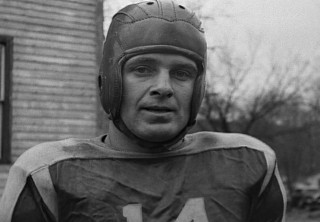
Here's my father, paused in a newsreel in 1938, a few years after the Talk of the Town called him "a smiling young man with a vicious body block." Here (as then) he's about to wallop hell out of one of his own homemade tackling dummies, this one a scowling man-shaped monster (back in the day, I used to paint individually villainous faces on them, never two alike). He would pose with a classroom full of them, like a school for Archer's Goons. Later on, he was filmed driving a hydra-headed machine of his own invention, snorting and shooting out a random sequence of rams at a startled Heywood Hale Broun. He always said he invented his practice equipment to give the players something else than the runt of the team to clobber. He spoke feelingly: playing for the Connecticut Aggies at 142 lbs, he was called the "watch charm guard." A luckpiece: he was All New England and a runner-up All American for 1929.
What the still captures is his young, unguarded face, a little of the glow of him. Being silent and black-and-white, the film cannot record the hum of nonsense words he traveled in, his love of the sheer sound of language; nor, alas, the blue of his eyes, forget-me-not.
He would have been 103 today.
Going out to look for Leonids.
Nine
Published on November 17, 2010 21:09
November 11, 2010
Winter
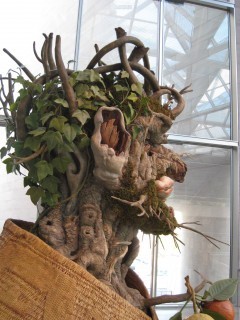
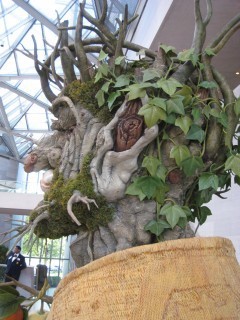
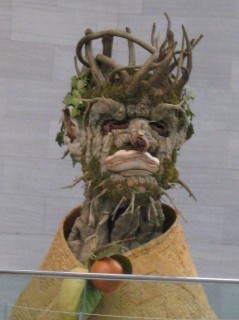
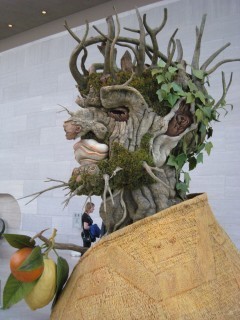
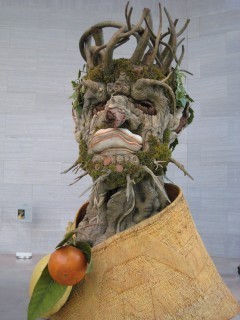
Winter (After Arcimboldo) by Philip Haas
Taken by Kristen Page at the Nature and Fantasy exhibit at the National Gallery of Art in Washington
"The northernmost ... was of a gnarled, woody ancient; his mouth was collapsed where the teeth had fallen out, his skin all warts and folds, eyes rheumy and peering. He was not, however, like wood or woody or rooty (Bruno came closer) but in fact made of wood he was nothing but an aged chestnut stump, yellow leaves or few or none for hair, his ear a broken limb's rotted bole, his lips a fungus.
"He was Winter. Old Age. Drought."
—John Crowley, Daemonomania
Nine
Published on November 11, 2010 17:14
Greer Gilman's Blog
- Greer Gilman's profile
- 41 followers
Greer Gilman isn't a Goodreads Author
(yet),
but they
do have a blog,
so here are some recent posts imported from
their feed.



